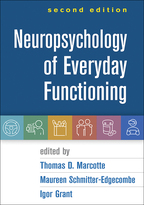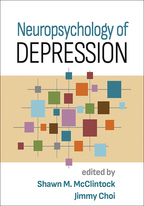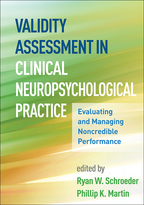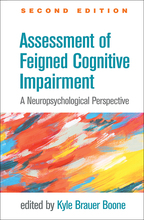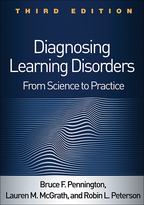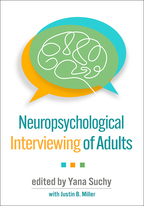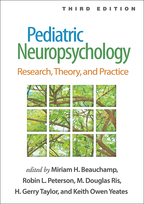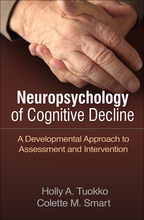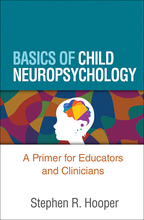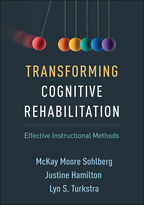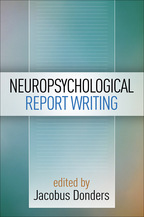Neuropsychology of Everyday Functioning
Second Edition
Edited by Thomas D. Marcotte, Maureen Schmitter-Edgecombe, and Igor Grant
Hardcovere-bookprint + e-book
Hardcover
orderMarch 15, 2022
ISBN 9781462548880
Price: $103.00 598 Pages
Size: 7" x 10"
e-book
orderJanuary 18, 2022
PDF and Accessible ePub ?
Price: $103.00 598 Pages
ePub is Global Certified Accessible
print + e-book $206.00 $123.60
orderHardcover + e-Book (PDF and Accessible ePub) ?
Price: 598 Pages
ePub is Global Certified Accessible
“This book is well-written and targeted to anyone seeking a deeper understanding of how neuropsychological issues impact the performance of everyday tasks. This edition includes over a decade of updated theories, methodologies, and related studies. It will be especially useful to researchers and graduate students….*****!”

—Doody's Review Service
“I am confident that the material in this book will aid clinicians in evaluating the ecological validity of their clinical assessments and in generating empirically supported recommendations for clients. Researchers will benefit from the comprehensive review of the burgeoning literature on everyday functioning. Even investigators whose research programs do not directly address functional abilities will find this volume to be a comprehensive summary that will stimulate thoughts on the functional impact of the neuropsychological constructs that they investigate. This book also could serve as an interesting text for a graduate seminar class. Such a course might spur future neuropsychologists to consider important functional issues early in their careers. In sum, I recommend that all neuropsychologists read this volume, as the information that it contains will certainly aid clinicians and researchers to improve the everyday functioning of our discipline.”

—Journal of the International Neuropsychological Society (on the first edition)
“Impressive in both scope and depth....It should be required reading for all clinical neuropsychology students/trainees as well as for all of us who strive on a daily basis to provide useful recommendations to patients and their families.”

—Archives of Clinical Neuropsychology (on the first edition)
“The chapter authors are well chosen and include many notable clinical scientists who have been actively developing practical assessment methods and empirically evaluating the capacity of assessment results to predict behavior....Although the primary audience for this book is clinical neuropsychologists, other psychologists can benefit from reading this text, either by deriving links to instruments and methods or by expanding their own conceptual frameworks.”

—PsycCRITIQUES (on the first edition)
“Clearly written. Topics are discussed in detail and references for additional reading are included. This is a book that will be of interest to many psychologists….For those new to the field, this book may serve as an excellent overview. Physicians and residents in the fields of neurology, neurosurgery, psychiatry, geriatrics, and even infectious disease (eg, HIV), could learn a great deal that may have clinical relevance to their patients’ functional abilities, from the discussion of both general theoretical and specific, practical matters. Social workers and marriage and family therapists, sometimes called upon to advise patients or families regarding functional concerns, could reference ideas for referrals or suggestions of resources to consider.”

—Annals of Clinical Psychiatry (on the first edition)
“A welcome addition to the field….The book is grounded in empirical science and is likely to be a valuable resource for both clinicians and researchers in the fields of neuropsychology, neurology, clinical psychology, psychiatry, gerontology, and rehabilitation medicine, as well as for graduate-level students, residents, and fellows in these fields….Stimulates critical thinking regarding current methods and provides a solid foundation to foster future research.”

—Applied Neuropsychology (on the first edition)
“Outstanding….Provides an excellent resource both for young scientists and for experienced investigators. I believe it could be useful as a graduate-level textbook in neuropsychology and particularly important for helping students transition between the detail of neuroanatomy, neuropsychological ability, and neuroscience to the broader application of neuropsychology to the real world of patients. I highly recommend this book and encourage all neuropsychologists to read it in the hope that they will benefit from the knowledge as much as I have.”

—Journal of Clinical and Experimental Neuropsychology (on the first edition)
“The second edition of this well-written, practical, sometimes thought-provoking and always easy-to-digest book about everyday functioning is a welcome treat. It covers a breadth of topics, from driving to medication management, cultural issues, sensors, virtual reality, and more. Readers will learn about new tests, new approaches, and new ways of measuring problems encountered in everyday life. Psychologists, occupational therapists, and other professionals engaged in person-centered rehabilitation with different diagnostic groups—including patients with stroke, Alzheimer’s disease and traumatic brain injury—will benefit from this book.”

—Barbara A. Wilson, OBE, PhD, clinical neuropsychologist, Oliver Zangwill Centre for Neuropsychological Rehabilitation and St. George’s Hospital, United Kingdom
“This updated guide is a 'must-have' for clinical neuropsychologists and other health professionals interested in the complex ways that cognition influences everyday functioning. The book takes an accessible, multidisciplinary approach to communicating important conceptual, methodological, and clinical issues. A particularly compelling feature of the second edition is the integration of new coeditor Schmitter-Edgecombe, who brings expertise in the technological aspects of cognition and functioning.”

—Steven Paul Woods, PsyD, Professor of Psychology, University of Houston, and Adjunct Professor of Psychological Science, University of Western Australia
“This is a very solid, worthwhile information source for the applied clinician and a useful and accessible text for the neuropsychology trainee. The volume is at the forefront of the integrated field of cognition and everyday functioning, which is especially heartening given the rapidity of change in this field. I am particularly impressed with the up-to-date chapters on naturalistic observations and new, technologically derived methods for ecologically valid assessments. I can easily see myself using this second edition in my graduate cognitive assessment courses as well as in my own neuropsychology practice.”

—L. Stephen Miller, PhD, Department of Psychology, University of Georgia
—Doody's Review Service
“I am confident that the material in this book will aid clinicians in evaluating the ecological validity of their clinical assessments and in generating empirically supported recommendations for clients. Researchers will benefit from the comprehensive review of the burgeoning literature on everyday functioning. Even investigators whose research programs do not directly address functional abilities will find this volume to be a comprehensive summary that will stimulate thoughts on the functional impact of the neuropsychological constructs that they investigate. This book also could serve as an interesting text for a graduate seminar class. Such a course might spur future neuropsychologists to consider important functional issues early in their careers. In sum, I recommend that all neuropsychologists read this volume, as the information that it contains will certainly aid clinicians and researchers to improve the everyday functioning of our discipline.”
—Journal of the International Neuropsychological Society (on the first edition)
“Impressive in both scope and depth....It should be required reading for all clinical neuropsychology students/trainees as well as for all of us who strive on a daily basis to provide useful recommendations to patients and their families.”
—Archives of Clinical Neuropsychology (on the first edition)
“The chapter authors are well chosen and include many notable clinical scientists who have been actively developing practical assessment methods and empirically evaluating the capacity of assessment results to predict behavior....Although the primary audience for this book is clinical neuropsychologists, other psychologists can benefit from reading this text, either by deriving links to instruments and methods or by expanding their own conceptual frameworks.”
—PsycCRITIQUES (on the first edition)
“Clearly written. Topics are discussed in detail and references for additional reading are included. This is a book that will be of interest to many psychologists….For those new to the field, this book may serve as an excellent overview. Physicians and residents in the fields of neurology, neurosurgery, psychiatry, geriatrics, and even infectious disease (eg, HIV), could learn a great deal that may have clinical relevance to their patients’ functional abilities, from the discussion of both general theoretical and specific, practical matters. Social workers and marriage and family therapists, sometimes called upon to advise patients or families regarding functional concerns, could reference ideas for referrals or suggestions of resources to consider.”
—Annals of Clinical Psychiatry (on the first edition)
“A welcome addition to the field….The book is grounded in empirical science and is likely to be a valuable resource for both clinicians and researchers in the fields of neuropsychology, neurology, clinical psychology, psychiatry, gerontology, and rehabilitation medicine, as well as for graduate-level students, residents, and fellows in these fields….Stimulates critical thinking regarding current methods and provides a solid foundation to foster future research.”
—Applied Neuropsychology (on the first edition)
“Outstanding….Provides an excellent resource both for young scientists and for experienced investigators. I believe it could be useful as a graduate-level textbook in neuropsychology and particularly important for helping students transition between the detail of neuroanatomy, neuropsychological ability, and neuroscience to the broader application of neuropsychology to the real world of patients. I highly recommend this book and encourage all neuropsychologists to read it in the hope that they will benefit from the knowledge as much as I have.”
—Journal of Clinical and Experimental Neuropsychology (on the first edition)
“The second edition of this well-written, practical, sometimes thought-provoking and always easy-to-digest book about everyday functioning is a welcome treat. It covers a breadth of topics, from driving to medication management, cultural issues, sensors, virtual reality, and more. Readers will learn about new tests, new approaches, and new ways of measuring problems encountered in everyday life. Psychologists, occupational therapists, and other professionals engaged in person-centered rehabilitation with different diagnostic groups—including patients with stroke, Alzheimer’s disease and traumatic brain injury—will benefit from this book.”
—Barbara A. Wilson, OBE, PhD, clinical neuropsychologist, Oliver Zangwill Centre for Neuropsychological Rehabilitation and St. George’s Hospital, United Kingdom
“This updated guide is a 'must-have' for clinical neuropsychologists and other health professionals interested in the complex ways that cognition influences everyday functioning. The book takes an accessible, multidisciplinary approach to communicating important conceptual, methodological, and clinical issues. A particularly compelling feature of the second edition is the integration of new coeditor Schmitter-Edgecombe, who brings expertise in the technological aspects of cognition and functioning.”
—Steven Paul Woods, PsyD, Professor of Psychology, University of Houston, and Adjunct Professor of Psychological Science, University of Western Australia
“This is a very solid, worthwhile information source for the applied clinician and a useful and accessible text for the neuropsychology trainee. The volume is at the forefront of the integrated field of cognition and everyday functioning, which is especially heartening given the rapidity of change in this field. I am particularly impressed with the up-to-date chapters on naturalistic observations and new, technologically derived methods for ecologically valid assessments. I can easily see myself using this second edition in my graduate cognitive assessment courses as well as in my own neuropsychology practice.”
—L. Stephen Miller, PhD, Department of Psychology, University of Georgia

